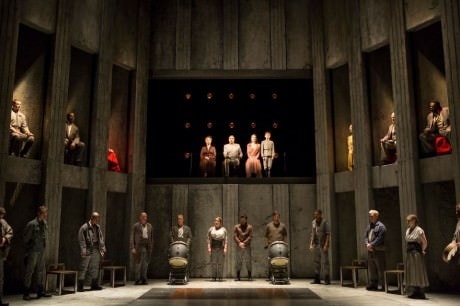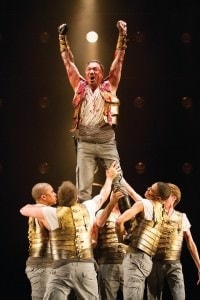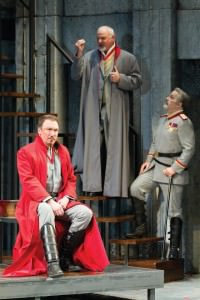Shakespeare’s Coriolanus is one of his least popular plays—its language lacks the normal Shakespeare smoothness, it’s violent and bloody, it’s long, and there are a lot of scenes that require active crowds (armies, riots, etc.), which are difficult to maintain, but Shakespeare Theatre Company’s (STC) staging, directed by David Muse, more than does the Bard justice. Although this production, staged in repertory with Wallenstein as part of STC’s ‘Hero/Traitor Repertory,’ is longer than we may be used to, I was drawn in from the very first scene, on the edge of my seat waiting to discover the ultimate fate of our hero, Coriolanus.

Coriolanus is one of Shakespeare’s works that resonates the most with me. Although it is set in the very early days of Rome, it has many themes that are still valid in today’s world. These themes include the struggle between the “haves” and the “have-nots,” war and loyalty, love and family, the dangerous arena that is the political world, and betrayal.
In the beginning scene, Rome’s plebeians riot over a food shortage and the unfair practices of its upper class and calls for the assassination of Caius Martius. Menenius (Robert Sicular), a Roman senator, enters and is almost able to calm them down, but Caius Martius (Patrick Page) enters and rails against the plebeians telling Menenius that the Senate has acquiesced and allowed the election of two Tribunes to the Senate, who would act as the voice of the common people in the Senate. The Tribunes, Brutus (Phillip Goodwin) and Sicinius (Derrick Lee Weeden), full of their self-importance and arrogance, witnesses Martius’ outbursts, and begins to plot ill will towards him.
Martius upon hearing of the impending invasion of Rome by a neighboring tribe, the Volscians, volunteers to fight under an old decorated general, Cominius (Steve Pickering) and thorough many brave acts ends up defeating the Volcians and taking the Volcian city of Corioles. During the fights, the plebians who have been forced into war for Rome run away and desert their posts, further solidifying Martius’ beliefs that they are fickle, unreliable, and have no loyalty to their homeland. Cominius, names Martius Caius Martius Coriolanus to honor his role in capturing Corioles.
Once back in Rome, Coriolanus is met by a celebratory crowd and his mother, Volumnia (Diane D’Aquila), his wife, Virgilia (Aaryn Kopp), and his son (Hunter Zane). Virgilia is ecstatic at the return of her husband, Volumnia is proud of Martius’ scars and that he has bled for love of his country. is nominated for the position of Consul, the highest position in Rome. Martius is then nominated to be Counsel, the highest position in Rome. In order to win the position, he must gain the plebeians consent and is required to don the “gown of humility.” Coriolanus is condescending to the plebeians he meets and with Brutus and Velutus rilling up the people, and despite Cominius and Menenius speaking up for him, Coriolanus is eventually exiled from Rome.

Heartbroken and angry that is country has forsaken him, Martius denounces his Rome-given name of Coriolanus and seeks out his enemy, the Volcian General, Aufidius (Reginald Andre Jackson), and offers to help him and the Volcians conquer Rome. As the Volcians draw near to Rome, Martius is beseeched by Cominius and Menenius to spare Rome, but he is deaf to their pleading. It is only when his mother, wife, and son come to him, beg him on their knees, and lay their lives down in front of him that he finally gives in and knowing that this will most likely mean his doom, agrees to broker peace between Rome and the Volcians. As Martius returns with the brokered deal from Rome, Aufidius, jealous of all that Martius has accomplished, incites the Volcian soldiers and Senators to kill Martius.
Each member of the company is excellently and perfectly cast in their roles. Coriolanus is a hero we all want to hate—he is arrogant, he is stubborn, he is harsh with his words. But he is a hero we can’t help but love and admire for his single-minded dedication to his country, his courage, his refusal to compromise his beliefs and standards, and his inability to lie to himself and say the words to placate the plebeians. Page as Martius exudes that military rigidness and righteous confidence that is the heart and soul of Coriolanus. Brutus, and Sicinius are arrogant and dishonest, and you can feel the slim of their deceitfulness oozing from them. D A’quila in the role of the matron—encouraging her son when he needs it, chastising him into doing her bidding—reminds me a bit of my own mother!
The set by designer Blythe R.D. Quinlan is minimal, but has a lot of meaning. It is designed to feel like an intimate space that has a lot of versatility and movement, but not require intricate and complicated furniture and scene changes. It is mostly concrete, which was invented by the Romans, but to me also signifies Coriolanus’ strength of conviction. Murrell Horton’s costumes followed along these themes. They were minimalistic, reminded me of Roman togas, but more modern and more versatile. With the switching of a band or breast plate, various actors were able to portray plebeians, Roman soldiers, and Volcian soldiers. This helps add to the idea that loyalties were fickle—one minute you can be a decorated hero, the next an exiled pariah.
The Sound Design by Mark Bennett and the Lighting Design by Mark McCullough were fantastic and obviously a lot of thought was put into it to make sure it added to the ambiance of the show. In the scene where Martius says goodbye to his family and friends after he is exiled, the haunting, lonely wailing of the string instrument (which I think was a Crotales played with a bow) in the background bought tears to my eyes. In the various action scenes, the drums seem to be keeping time to the excited beating of my heart. McCullough uses the various lighting elements to highlight scenes/characters. In the various scenes where Brutus and Sicinius are plotting against Martius, the lights are dimmed and darkened. In several of the scenes, the plebeians are actually seen operating the lighting equipment, which further supports the ideas that the plebeians have to work for their keep.

If you’re looking for an spell-binding, edge-of-your-seat exciting evening of action and adventure, courage and conviction, love and loyalty to country, brought together with brilliant acting, amazing direction, and thoughtful incorporation of set, costume, sound, and lighting elements Coriolanus is not to be missed!
Running Time: Two and a half hours, with a 15-minute intermission.
Coriolanus plays through June 2, 2013 at Shakespeare Theater Company’s Sidney Harman Hall – 610 F St NW, in Washington, DC. For tickets, call the box office at (202) 547-1122, or stop by at the Harman Hall box office, or purchase them online.





Hunter Pugh who plays Coriolanus’ son is our Grandson and we are so proud of him.
I am also proud of Hunter Pugh.